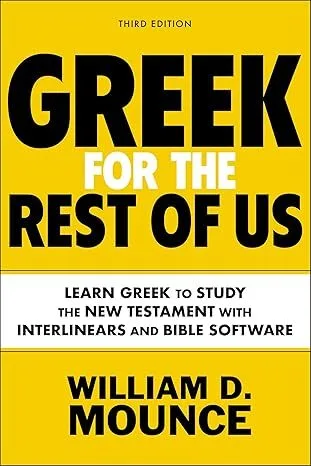Pronunciation Guide: eth-NAR-khace
Basic Definition

Key Information
ἐθνάρχης

Strong’s Entry
g1481
Strong’s G1481: An ἐθνάρχης (ethnarchēs) was a governor or ruler appointed to govern a province or territory on behalf of a higher authority. This term specifically referred to a political leader who had jurisdiction over a particular ethnic group or nation while still being subject to a higher sovereign power. In biblical context, it describes an official with significant but delegated authority over a specific people group or region.
Etymology and Morphology
- Part of Speech: Noun (masculine)
- Root Words: Compound of ἔθνος (ethnos, “nation/people”) + ἄρχω (archō, “to rule/govern”)
- Language Origin: Hellenistic Greek
- Primary Usage: Historical narrative and political descriptions
- Frequency: Extremely rare in the New Testament (appears only once)
ἐθνάρχης Morphology:
- ἐθνάρχης (nominative singular) – ethnarch/governor
- ἐθνάρχου (genitive singular) – of the ethnarch
- ἐθνάρχῃ (dative singular) – to/for the ethnarch
- ἐθνάρχην (accusative singular) – the ethnarch (as direct object)
Origin & History
The term ἐθνάρχης emerged during the Hellenistic period as the Greek kingdoms established various administrative positions to govern their expanding territories. It gained particular significance during the late Seleucid and early Roman periods. Diodorus Siculus (1st century BCE) used similar terminology when describing provincial governors in his historical works, particularly in his “Bibliotheca Historica.”
In Jewish history, the title gained prominence after the Maccabean revolt, when Jonathan Maccabeus and later Simon Maccabeus were appointed as ethnarchs of Judea by the Seleucid rulers, combining both political leadership and religious authority as recorded in 1 Maccabees. The Jewish historian Josephus, in his “Antiquities of the Jews,” frequently employs this term when describing the political structure of Jewish governance under foreign rule, particularly when referring to Hyrcanus II and later Archelaus, the son of Herod the Great.
Expanded Definitions & Translation Options
- Provincial Governor – An appointed official governing a specific ethnic region
- Ethnic Ruler – A leader with jurisdiction over a particular people group
- Vassal Administrator – A subordinate ruler accountable to a higher sovereign
- Territorial Prefect – An official with delegated authority over a defined territory
ἐθνάρχης Translation Options:
- Ethnarch – Most precise but less familiar to English readers; preserves the specific political and cultural connotation
- Governor – More accessible translation that captures the administrative function but loses the ethnic specificity
- Prefect – Emphasizes the appointed nature and delegated authority aspect but is historically associated with Roman titles
- Ruler of the people – Expanded translation that conveys both components (ethnos + archō) but is less concise
- Provincial leader – Modern equivalent that communicates regional authority but lacks historical precision
Biblical Usage
In the New Testament, ἐθνάρχης appears only once, in 2 Corinthians 11:32, where Paul describes his escape from Damascus: “In Damascus, the ethnarch under King Aretas was guarding the city of the Damascenes in order to seize me.” This reference identifies a specific official appointed by the Nabataean King Aretas IV, who controlled Damascus during certain periods in the first century CE. This official was tasked with governing the city on behalf of the king and was apparently involved in the persecution of Paul.
The Septuagint (LXX) uses this term or closely related forms in several passages referring to Jewish leadership under foreign domination, particularly during the intertestamental period. While the specific form ἐθνάρχης is rare in biblical literature, the concept of appointed governors with delegated authority over ethnic regions is a recurring theme in biblical historical narratives.
- “In Damascus the ethnarch [ἐθνάρχης] under King Aretas was guarding the city of Damascus in order to seize me.” 2 Corinthians 11:32
Cultural Insights
The role of the ἐθνάρχης provides a fascinating window into the political structures of the ancient Near East during the Hellenistic and early Roman periods. These officials served as cultural bridges, often being natives of the region they governed while serving at the pleasure of foreign powers. In Jewish history, this position took on particular significance during the Hasmonean dynasty (167-37 BCE), when Jewish leaders were granted the title of ethnarch by Seleucid kings, allowing them a measure of self-governance while still acknowledging foreign sovereignty.
The ethnarch mentioned in Paul’s account in 2 Corinthians reveals the complex relationship between the Roman Empire and client kingdoms like the Nabataean realm under Aretas IV. Damascus, though technically within the Roman province of Syria, experienced periods of Nabataean control through diplomatic arrangements. The ethnarch’s attempt to arrest Paul demonstrates how religious conflicts could become entangled with political jurisdictions, as the Jewish community in Damascus may have pressured this official to take action against the apostle, whom they viewed as a dangerous apostate.
Theological Significance
The appearance of ἐθνάρχης in Paul’s narrative of persecution and escape carries profound theological implications regarding God’s sovereignty over earthly authorities. Though ethnarchs wielded considerable power within their jurisdictions, the apostle’s testimony reminds us that יהוה (Yahweh) remains the ultimate authority above all human governance. Paul’s dramatic escape “through a window in the wall” (2 Corinthians 11:33) demonstrates how God can provide deliverance even when the forces of worldly power align against His servants.
This single New Testament instance of ἐθνάρχης also illuminates the broader biblical theme of believers living under earthly authorities that may be hostile to the Kingdom of God. The Messiah’s followers are called to respect governmental authority (Romans 13:1-7), yet ultimately their citizenship is in heaven (Philippians 3:20). Paul’s experience with the ethnarch in Damascus exemplifies this tension between submission to earthly rule and obedience to God’s higher calling, showing that when the two conflict, “we must obey God rather than men” (Acts 5:29).
Personal Application
When facing opposition from those in positions of power, we can draw courage from Paul’s Damascus experience with the ethnarch. Just as God provided an escape route for His apostle when a government official sought to arrest him, He remains faithful to deliver His people according to His perfect timing and purposes. This doesn’t always mean we’ll avoid suffering or persecution, but it assures us that no earthly authority—whether an ancient ethnarch or a modern government—can ultimately thwart God’s plan for those who are called according to His purpose.
Consider the “ethnarchs” in your own life—those who exercise authority over you in various domains. How might God be calling you to navigate these relationships with both appropriate respect for delegated authority and ultimate allegiance to Him? Perhaps you’re in a position of leadership yourself; the biblical concept of ethnarch reminds us that all authority is delegated and accountable to a higher power. Leading with this awareness fosters humility and just governance that honors the One who is King of kings and Lord of lords.
Related Words
- ἀρχή (archē) [ar-KHAY] – Beginning, first principle, rule, authority; shares the root concept of rule or governance but applies more broadly to any position of leadership or primacy. While ἐθνάρχης specifically refers to ethnic governance, ἀρχή encompasses the general concept of authority or rulership. See G746
- ἄρχων (archōn) [AR-khone] – Ruler, commander, chief, leader; refers to various types of rulers without the specific ethnic jurisdiction implied by ἐθνάρχης. An ἄρχων could govern any type of domain, whereas an ἐθνάρχης specifically ruled over an ethnic group or nation. See G758
- ἡγεμών (hēgemōn) [hay-geh-MONE] – Governor, leader, prefect; often used for Roman provincial governors like Pilate. While similar to ἐθνάρχης in denoting regional governance, ἡγεμών typically referred to direct Roman appointees rather than rulers of client kingdoms. See G2232
- τετράρχης (tetrarchēs) [teh-TRAR-khace] – Tetrarch, ruler of a fourth part; similar to ἐθνάρχης in being a ruler with delegated authority, but specifically indicates governance over a quarter of a region, as with Herod Antipas in Galilee. See G5076
- βασιλεύς (basileus) [bah-sih-LUCE] – King, monarch, sovereign; represents a higher level of authority than ἐθνάρχης, as ethnarchs were typically appointed by and subordinate to kings like Aretas mentioned in 2 Corinthians 11:32. See G935
Did you Know?
- Did you know? The ἐθνάρχης mentioned in 2 Corinthians 11:32 served under King Aretas IV, whose daughter was married to Herod Antipas before he divorced her to marry Herodias—triggering political tensions that impacted the ministries of both John the Baptist and Yeshua. This interconnected web of political marriages and alliances forms the backdrop to several critical New Testament events, illustrating how God’s redemptive work unfolded within complex historical circumstances.
- Did you know? The position of ethnarch had special significance in Jewish history, as it was the title granted to several Hasmonean rulers, including John Hyrcanus I. These Jewish ethnarchs held both political and religious authority, serving as high priests while governing Judea as vassals to foreign powers. This dual role created tensions similar to those faced by believers today who must navigate the demands of religious conviction within secular governance structures.
- Did you know? In modern Greece, the term “ethnarch” (εθνάρχης) gained renewed significance during the Ottoman period and Greek independence movement, being applied to Orthodox Church leaders who functioned as both religious and civil authorities for Greek communities under Ottoman rule. Archbishop Makarios III of Cyprus (1913-1977) was commonly referred to as “Ethnarch” for his dual religious and political leadership roles. This demonstrates how biblical terminology can evolve and find new applications in later historical contexts while maintaining its core meaning of delegated authority over a specific people group.
Remember This
The ἐθνάρχης reminds us that while human authorities may have their jurisdictions, the Messiah’s followers answer to a higher King whose kingdom transcends all earthly borders and whose deliverance no worldly power can prevent.
Note: While this entry strives for accuracy, readers engaged in critical research should verify citations and keyword occurrences in their Bible translation of choice. For Biblical citations, the F.O.G Bible project recommends Logos Bible software.
Strong's g1481




